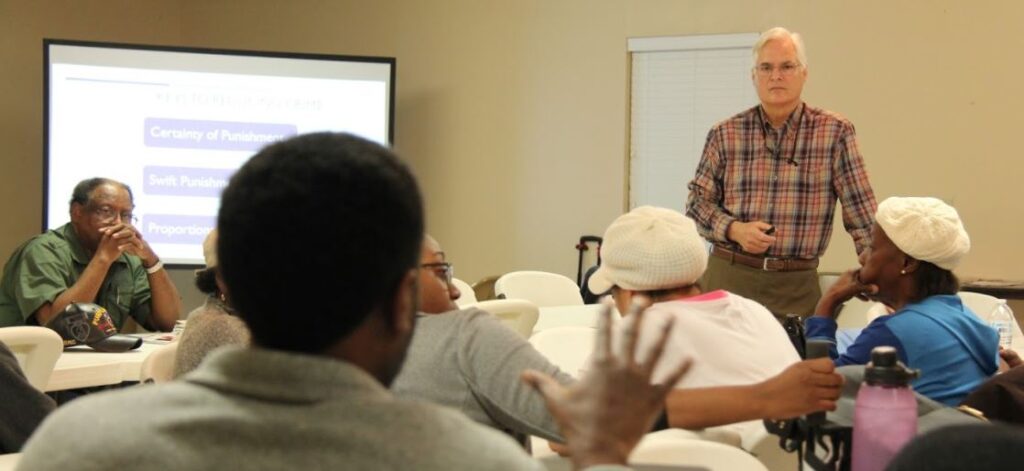Our Assistant District Attorneys are
specially trained to prosecute sex crimes.
We fight for justice on behalf of victims of sex crimes.
Sex Crimes
 For immediate emergency help, call your local Sheriff’s office.
For immediate emergency help, call your local Sheriff’s office.
Sex crimes are among the most distressing and damaging of crimes. As a result of their criminal acts, sexual offenders can cause unyielding and severe emotional, physical, and psychological suffering on their victims. The results can be enduring, and the healing process can be a difficult journey.
The 22nd Judicial District District Attorney’s Office recognizes this and actively pursues justice for victims of sexual crimes. Our Office has accomplished, trained attorneys dedicated exclusively to the review of sex crimes cases for adults and juveniles. We handle such cases as: carnal knowledge, felony physical child abuse, child pornography, computer aided solicitation, obscenity and sex offenders who fail to register with local law enforcement authorities.
When a sex crime is presented to our Office by the arresting officer, our Sex Crimes Prosecutional Review Attorney completes a thorough screening process, which includes evaluating the police report and law enforcement investigation, obtaining and reviewing any video, photos, medical records, witness statements, defendant statements and speaks directly with the detectives and witnesses. Perhaps most importantly, our ADA will have a face-to -face meeting with the victim and possibly the victim’s family members to explain the process and obtain as much information as possible to achieve justice in the case.
After a review of all of the facts of the case, the Prosecutional Review Attorney gives her recommendations to the District Attorney. If the case is accepted, it goes to the Misdemeanor or Trial divisions, and we move forward with prosecution of these offenders.
WATCH the video below for information on our New Crime Victims Unit.
New Crime Victims Unit
FAQS
I was just sexually abused. What should I do?
Get help immediately. Call 911. Police officers will come to where you are and take you to a hospital, so that you can be treated and DNA evidence can be collected. The hospital will photograph any injuries.
If you don’t want to report what happened to you, you should still go to the hospital, both for your own health AND so evidence can be collected, which will make a stronger case if you later decide to make a report. Be sure to tell a family member or friend at once. Seek advice from someone you trust, so that you feel safe and get medical attention.
I was sexually abused in the past, but I never reported it. Is there anything I can do?
Even if you were sexually abused in the past, you can still make a report, by calling your local police agency.
I am not sure if what happened to me is a sexual abuse. What should I do?
Some victims of sexual abuse may be unsure if a crime was committed. For instance, some victims do not know that in this country a husband may not force his wife to have sex with him. Some victims may not remember clearly what happened to them, particularly when drinking is involved. If you think you may have been sexually abused, you should contact law enforcement authorities.
I am not sure I can talk about what happened to me.
The local law enforcement agencies and the District Attorney’s Office have special sex crimes units with detectives and lawyers trained to handle these cases. They have a lot of experience and are trained to be sensitive to your concerns as a survivor of sexual abuse. They will make you comfortable, explain the steps of the process to you, and answer your questions. Most of all, they understand that what happened to you is not your fault.
What happens when an arrest is made?
If you know who attacked you, the police may be able to make an arrest. Even if the person is a stranger to you, other evidence may be able to identify him. You may need to go to the police station to view a line-up or help the detectives with parts of the investigation. After the arrest, a Assistant District Attorney in the Sex Crimes Unit will be assigned to your case. An ADA will work with you from the beginning to the end of your case.
The criminal case begins with the defendant being brought before a judge, who will decide whether or not to set bail. An ADA can ask the judge to issue a no contact order. This order will tell your assailant that he may not come near you, or contact you in any way. Although in most cases the defendants plead guilty, some do go to trial. The ADA assigned to your case will get you ready to testify, if that happens.
I never saw the face of the person who attacked me. Should I still report this?
In some cases, the victim never sees the face of the person who did the attack. DNA evidence can prove who did the crime, even if you can’t identify anyone. Evidence collected by the police at the crime scene, such as bed linens, clothing, and items touched by the offender, plus physical evidence collected at the hospital, can identify the person who committed the crime. The police can also gather other types of physical evidence, such as surveillance videos and telephone and computer records, that can help identify your attacker.
Contacts
Email: communicate@22da.com attention Sex Crimes
St. Tammany – (985) 809-8383
Washington – (985) 839-6711
The St. Tammany Parish Sheriff’s office provides further information on this community notification website. Or contact the awareness program.
